You’re ready to monetize your podcast and you’ve decided to sell ads. Now you need to know how to get podcast sponsors.
Sponsorships are one of the most popular and effective ways to create revenue with your podcast. Podcast advertising is attractive to advertisers because it’s an intimate format where listeners develop strong bonds with hosts. Nearly two thirds of podcast listeners take actions based on the ads they hear during podcasts.
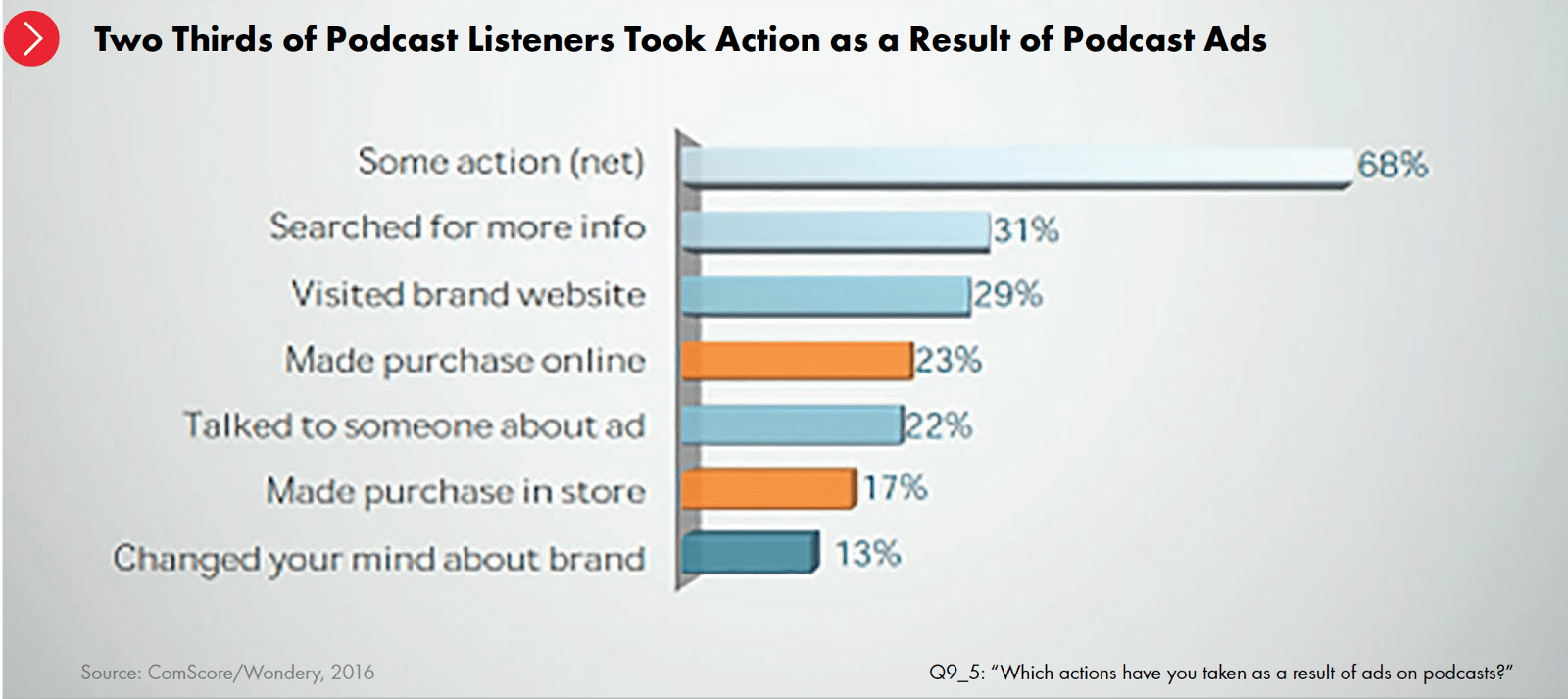
Finding podcast sponsors is easy, but finding the right ones can be a bit challenging, which is why so many hosts don’t know how to get podcast sponsors. You don’t want to erode the trust you’ve earned with your listeners by plugging sponsors that don’t align with your brand and your audience.
Before we dive into how to get podcast sponsors, let’s discuss how sponsorship works.
How Podcast Sponsorship Works
Prices for podcast sponsorships are typically based on the number of average downloads. Sponsors pay on a cost per mille (CPM) basis. Rates range from $18 to $50 CPM, though podcasts like This American Life or HowStuffWorks with millions of listeners can pull in a lot more.
Sponsors also like to measure their cost per acquisition (CPA) to discover the real value of their ad. This is the number of sales, signups, or downloads they receive as a result of your ad spot. To measure this, sponsors may give you a special coupon code or referral link so you get credit when they get new customers or users.
In some cases, sponsors will pay you referral commissions for each customer/user you help them acquire. This is good for the sponsor because it means they only pay for results and can take chances on podcasts who have never run advertisements before. This is how most podcasts get their first advertisers.
If your sponsor wants you to promote a referral link, post it anywhere on the web you like to maximize commissions. Post it on Facebook or other social media pages. Send it to your email list and across your website.
Types Of Podcast Advertisements
Ads usually have different pricing depending on their placement within your podcast. There are three main areas sponsor advertisements are typically placed.
Pre-roll and post-roll ads
Pre-roll are ads that play before the podcast starts while post-roll ads are played after the podcast content finishes.
Pre-roll and post-roll ads are usually 15-30 seconds long and fairly straightforward. “This podcast is sponsored by Acme Tools. Check out their line of…”. Typical CPMs for these ad placements fall between $15 and $20.
Mid-roll ads
Mid-roll ads are played during the podcast, breaking up the episode’s content with sponsor’s messages. Mid-roll ads are generally more free form. Sometimes the sponsor will give you a script they want you to read word-for-word. In other cases, they’ll give you some talking points to cover. If the sponsor gives you some flexibility, mix up the ad in each episode so you don’t train listeners to tune it out.
Mid-roll ads are slightly more valuable to podcast sponsors because the audience is captive. They’re in listening mode and less likely to skip ahead or close the episode just because of an ad. Due to this engagement, average CPMs fall between $20 and $25 for most podcasts.
How Much Can You Earn From Podcast Sponsors?
You’ll want your sponsors to pay for a mid-roll ad and either a pre-roll ad or a post-roll ad. Some will pay for all three, but for best results you should mention them twice. If you’re having trouble landing a sponsor, consider offering a free plug.
Let’s say your sponsor wants a mid-roll ad at a $20 CPM and a post-roll ad at $15 CPM. That’s a $35 per thousand listeners per episode. If an episode gets 2,000 views, you would earn $75 for that episode. If an episode gets 20,000 views, you would earn $1,500 for that episode.
Check out the Podcast Sponsorship Calculator to learn what your audience is worth. This resource will help you determine what CPM is appropriate to charge advertisers.
How to Secure Podcast Sponsors
In the beginning of your show’s life, you’ll have to be aggressive about finding sponsors. Once you become popular, however, sponsors will come to you and you’ll have some leverage.
Follow these 5 steps to start securing your dream advertisers.
Step 1: Consider your niche
The most important part of sponsorship is finding sponsors that fit your niche. Your audience will grow bored and frustrated if your ads are totally irrelevant to them.
Besides, you want your ad to fit your audience so the sponsors do well too. This way they’ll keep advertising through your show and you can raise your rates over time.
So your first step is to think about your ideal listener. In marketing this person is referred to as your avatar or persona. Fix this person your mind; their likes, dislikes, preferences, problems, needs, etc.
When someone asks us how to get podcast sponsors, this is the first piece of advice we give because it’s that important. If you don’t know who listens to your podcast, you’ll probably end up with sponsors they hate.
It’s a simple document that contains valuable information about your typical listener.
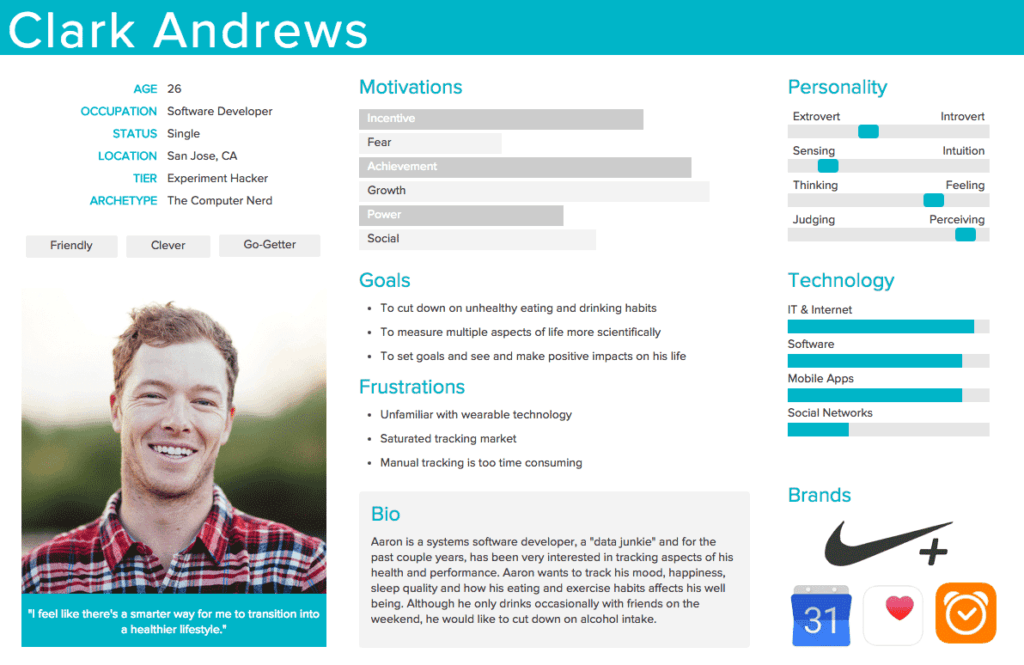
Your persona should include demographic information, a short description of the listener, and most importantly, what they want. After all, people listen to podcasts because they want something, usually information or entertainment. It’s important to know what they want so you can serve it to them.
You may find that all of your listeners don’t fit into the same group, so you might need multiple personas to represent different kinds of listeners. For instance, you might have one persona for marketing associates and another for marketing executives.
Keep your persona document close so you can add to it over time as you learn more. It will also help you craft podcast episodes.
Step 2: Search for potential sponsors
Now that you understand who your listeners are, what they enjoy, and what turns them off, it’s time to hunt for potential sponsors who match.
Where can you find potential sponsors?
- Browse the ads on website or blogs in your niche.
- Check out companies who advertise in industry magazines.
- Review businesses who purchase paid ads on social media.
- Look out for any brand representatives who post in your online community/group.
- Google for common phrases in your niche and check out the sponsored slots.
- Ask your listeners what kinds of products they like and buy often.
One easy way to find sponsors is to listen to other podcasts in your niche and approach the companies who sponsor them. They’re already paying to reach that demographic of listeners, so they might be receptive to your proposal. Even if those companies don’t want to advertise with you, at least you’ll have a better idea of what kinds of companies to approach.
For example, let’s say you host a podcast about personal finance. Listen to a competing podcast and identify who sponsors them. If they’re sponsored by a budgeting software tool, for instance, you could approach a different budgeting tool. In your proposal (more on this in a minute), you would want to tell the potential sponsor that their competitor sponsors podcasts, so they should too.
You’ll learn the best places to source sponsors over time, especially if you hang out in any podcast communities. Join Podcast Hackers, Castos’ own Facebook group. It’s a community built to support podcasters on their journey to produce a successful show.
Five more tips to find the right sponsors
Part of learning how to get podcast sponsors is trial and error. Use these five tips to land your first deal.
1. Don’t rule out the little guys
Your first sponsor (or any sponsor, for that matter) doesn’t have to be a big-name company that everyone knows. There are countless small businesses and solo founders who are desperate for advertising opportunities. In fact, your listeners may appreciate you more if you make them aware of lesser known companies who sell great products.
2. Don’t be too picky about price
Naturally you want to earn as much as you can from your ads, but don’t use revenue as your standard to pick sponsors. Prioritize the ones that fit your audience best so more of your listeners will engage with the ads. It’s better to sacrifice a few dollars to get ads your listeners enjoy.
3. Choose sponsors who don’t bore you
If promoting a sponsor will bore you because you don’t care about the product, it will bore your listeners too. You don’t have to fall in love with your sponsor, but you should be at least a little excited about them.
4. Stick to companies you respect
Your listeners will know right away if you don’t whole-heartedly recommend a product or service. Before you promote something, make sure you actually approve of that thing enough to stake your reputation on it. If you aren’t sure it’s a good product/service, ask for a sample from the sponsor so you can learn more about it.
5. Keep an open mind
There’s no single, surefire way to find sponsors. Some sponsors have clear programs for you to follow. Others are more flexible. As you hunt for sponsors, don’t be afraid to get creative and look in unusual places. Pitch potential sponsors who haven’t advertised before.
6. Consider a proof-of-concept sponsor
You may find it challenging to get paying sponsors without a history of results, especially if they want a clear idea of how much traffic you’ll send to their website and how well that traffic will convert.
Consider working with a brand for free for a short time as a proof-of-concept. Plug their company at the beginning, middle, and end of your podcast with a call-to-action to visit their site with a special link (that you can track) or a coupon code.
You don’t have to promote someone for free for long, just a few episodes to gather some data. This way you’ll be able to say “We drove $X revenue for our sponsor” or “We sent our sponsor X website visitors.” This kind of data will help you get sponsors in the future.
Step 3: Create your sponsorship proposal
Impress your potential sponsors with a proposal that exemplifies your personality and professionalism. For best results, fashion your pitch into a slide deck for sponsors to flip through.
Your proposal deck should include:
- Title and logo of your podcast.
- A summary of your podcast’s niche. Include episode length, subject, format, and any popular guests you’ve had on the show or interviews you’ve conducted.
- Information about you, the hosts, and anyone else involved in production (photos and bios).
- Information about your listeners, such as demographics, download statistics, and any evidence you have that your listeners really love your show.
- Proposed rates and partnership ideas. Make it clear that you’re open to their ideas too.
- Your contact information.
Below you’ll see a few slides from Spirits Podcast’s slide deck.
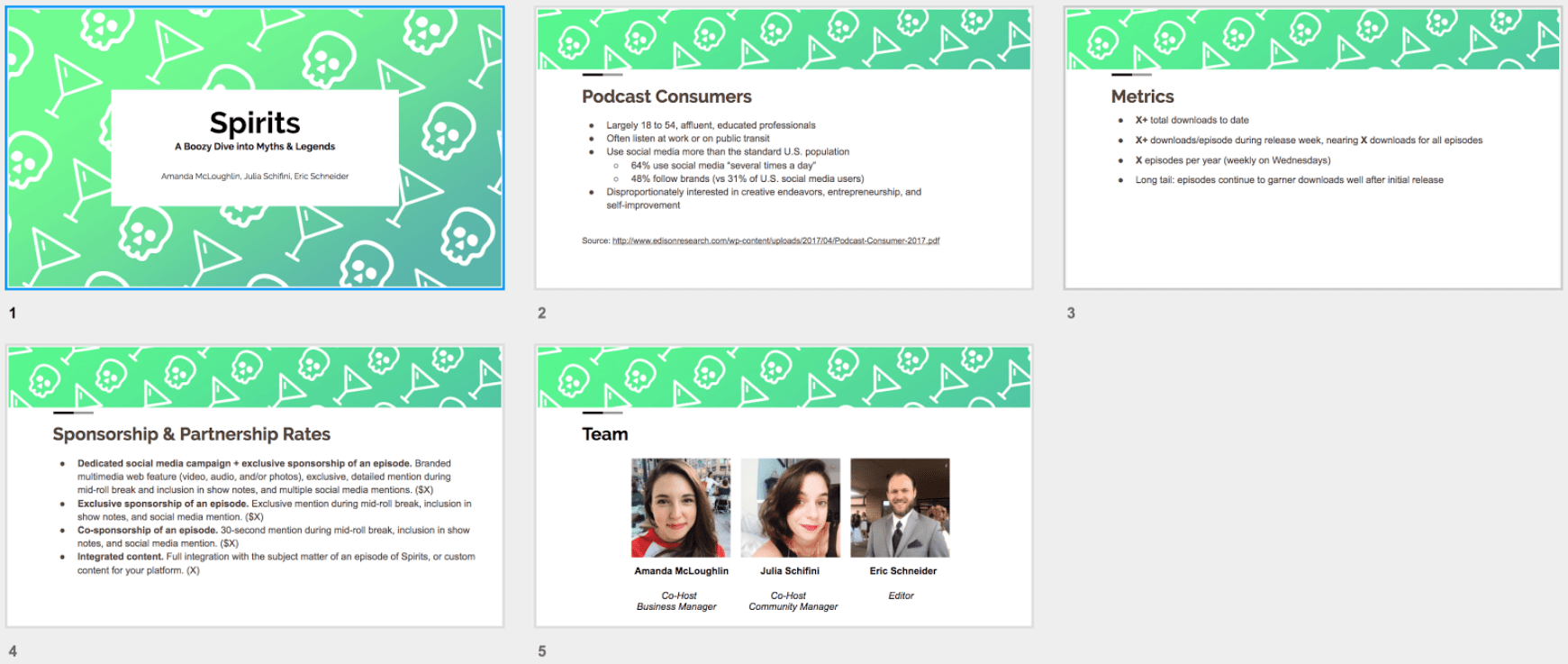
When you make your first proposal slide deck, save a “master” version as a template. Then customize the template whenever you send it out to a new sponsor. Use specific language and imagery in the deck to connect with the potential sponsor.
For example, let’s say you host a podcast about computers. When you reach out to potential sponsors who sell Windows products, use images in your slide deck of PCs. But when you reach out to potential sponsors who sell Mac products, show photos of Macs.
It’s especially important to let your brand personality show in your proposal. If you want a sponsor your fans don’t hate, it’s important to find one who aligns with your personality and vision.
Step 4: Send your pitch
Once your proposal is ready, it’s time to email it to your list of potential sponsors. This will be the first interaction sponsors have with you and your business, so it’s important to compose a quality email.
Summarize some of the points from your presentation, like who you are and the kind of podcast you host. It’s also a good place to drop some names of popular people who have been on your show or you know listen to your show.
Most importantly, explain why sponsoring your show is a good opportunity for them and their audience. Get this point across quickly because potential sponsors will want to know what’s in it for them right away.
Before you email your proposal, it helps to create some other signals that you’re interested in their brand and their products. Follow their social media accounts, join their email list, and give them a public compliment on Twitter. These little actions will sweeten the deal.
Podcast sponsorship pitch template
We’ve put this pitch email together to give you an idea of what you should say in your first email.
Hi [SPONSOR NAME]
My name is John Doe and I’m the creator and host of Modern Ecommerce, a podcast about ecommerce growth and marketing.
I love your business and wanted to discuss working together to promote your company. We don’t have a sponsor at the moment, so you’ll find our rates attractive.
Our audience overlaps with yours substantially. In fact, some of our listeners already use your product. We believe we can drive a significant amount of targeted traffic to your website.
Each episode of our podcast is 30-45 minutes long. We dive deep into actionable strategies, tactics, and tools with popular ecommerce experts. We market each episode aggressively to our email list and across our social media channels, as well as our guests’ social media channels.
We average 2,000 downloads per episode. That number has been steadily climbing each week. We expect to reach 3,000 downloads per episode by mid-August.
If you’d like to check out our show, we recommend [EPISODE LINK], [EPISODE LINK], and [EPISODE LINK]. They will give you a feel for the type of content we produce.
I have attached a PDF with more information about our show, our audience, and our team. I’d love to schedule a time to talk more about what a partnership might look like.
Cheers,
John Doe
Naturally, you’ll want to customize that template for your own needs. Try not to come off like a corporate robot. Sponsors expect you to have a personality, so don’t be afraid to inject it into your pitch.
Finally, make sure to tweak your pitch over time as you learn more about your type of sponsors. Try to respond to their objections before they have them.
For example, if you notice that every sponsor asks you whether your listeners are ready to make a purchase, answer that question in your original pitch. This will make you seem like a perfect fit early in your relationship.
Step 5: Follow up with potential sponsors
Just because a potential sponsor doesn’t respond to your pitch doesn’t mean you should abandon all hope. Your message could have just gotten lost in their inbox. There’s a good chance they receive a lot of pitches and just need time to get through them.
Send a follow up emails seven days after your original pitch. Politely ask them for an answer to your pitch, even if they intend to decline you offer.
Most people appreciate a follow up email, so don’t worry about annoying anyone. If a sponsor does grow annoyed at your persistence, well, they weren’t going to sponsor you anyway, so you won’t lose anything.
End your follow up graciously. Let them know they’re welcome to contact you any time. Then move on to other opportunities.
Here’s a useful follow up template:
Hi [SPONSOR NAME],
I sent an email last week about possibly working together to promote your company. I just wanted to follow up to make sure you didn’t miss my email. I believe your product would be a great fit for my audience and we could have a prosperous relationship.
Tell what you think or if you have any ideas. I understand if you refuse, but please let me know either way.
Thanks again for your time!
Cheers,
John Doe
Should You Take On Multiple Sponsors?
While it’s possible to run ads for multiple sponsors during the same episode, most podcast pros find this to be a bad idea.
For one, listeners can grow annoyed by multiple ads. Like everyone else, they have a limited amount of time. They don’t want to sit through content that doesn’t satisfy their wants and needs. At best they’ll start skipping through your ads. At worst they’ll find a new podcast.
Not only do they have to sit through boring content, but they start to question your integrity. They wonder if you really recommend all those products or if you’re just doing it for the cash.
It’s also bad for the sponsor whose message gets watered down. It’s hard enough to get your listeners to take action based on one ad. They certainly won’t follow your directions in two or more ads. This means poorer results for sponsors who may decide to seek other podcasts for their advertising dollars.
Fortunately, this is rarely a dilemma you’ll have to deal with. Most sponsors will insist on exclusivity while you work together.
Summary
There you have it. Now you know how to get podcast sponsors your fans won’t hate. But it’s also important to solicit feedback from your listeners to make sure your sponsorship ads don’t turn them off.
Podcasts are remarkably effective tools to create revenue, but they require work. If you put in the time to find quality sponsors, instead of just any sponsor, you’ll enjoy the rewards of content listeners and some cash in your pocket.
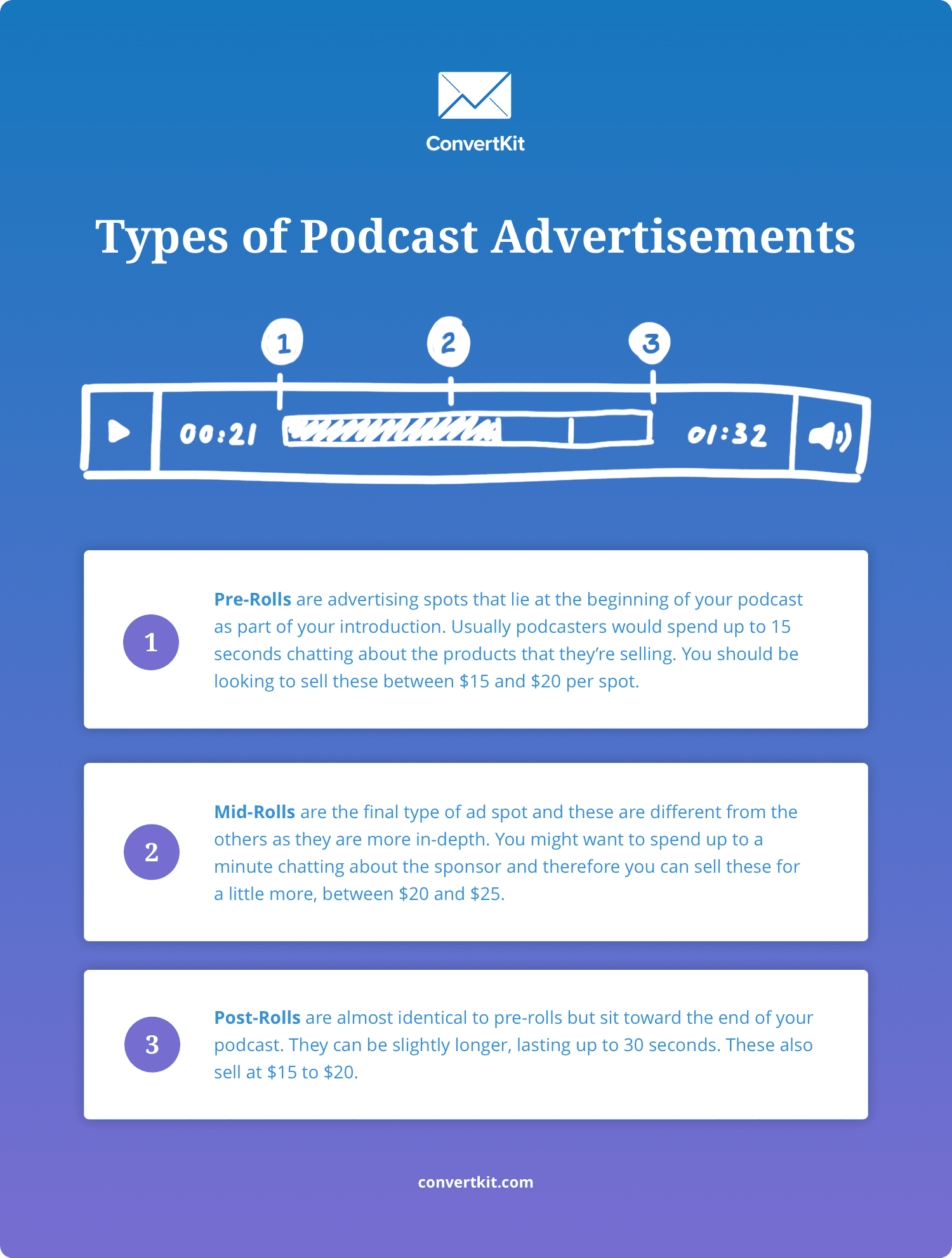
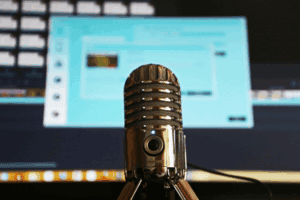


Comments are closed.